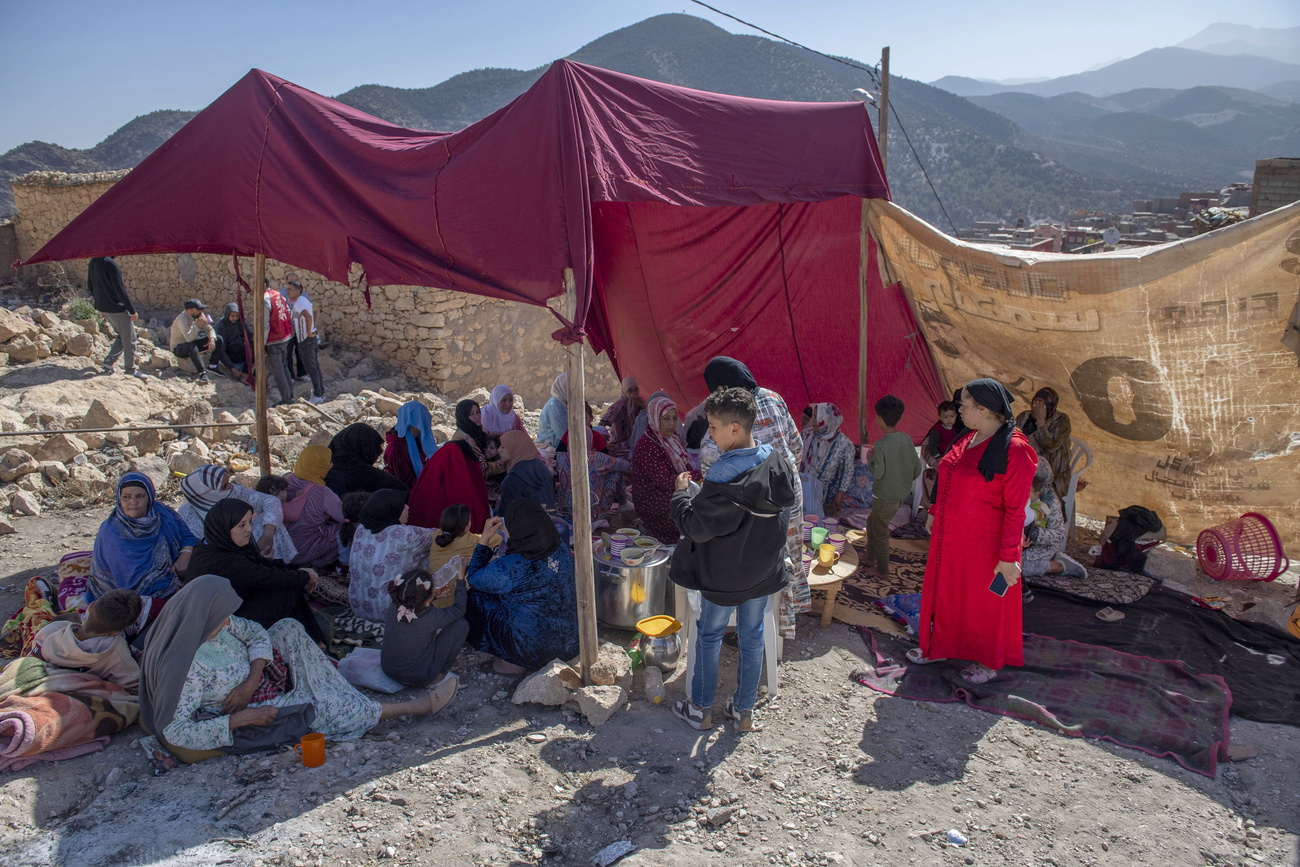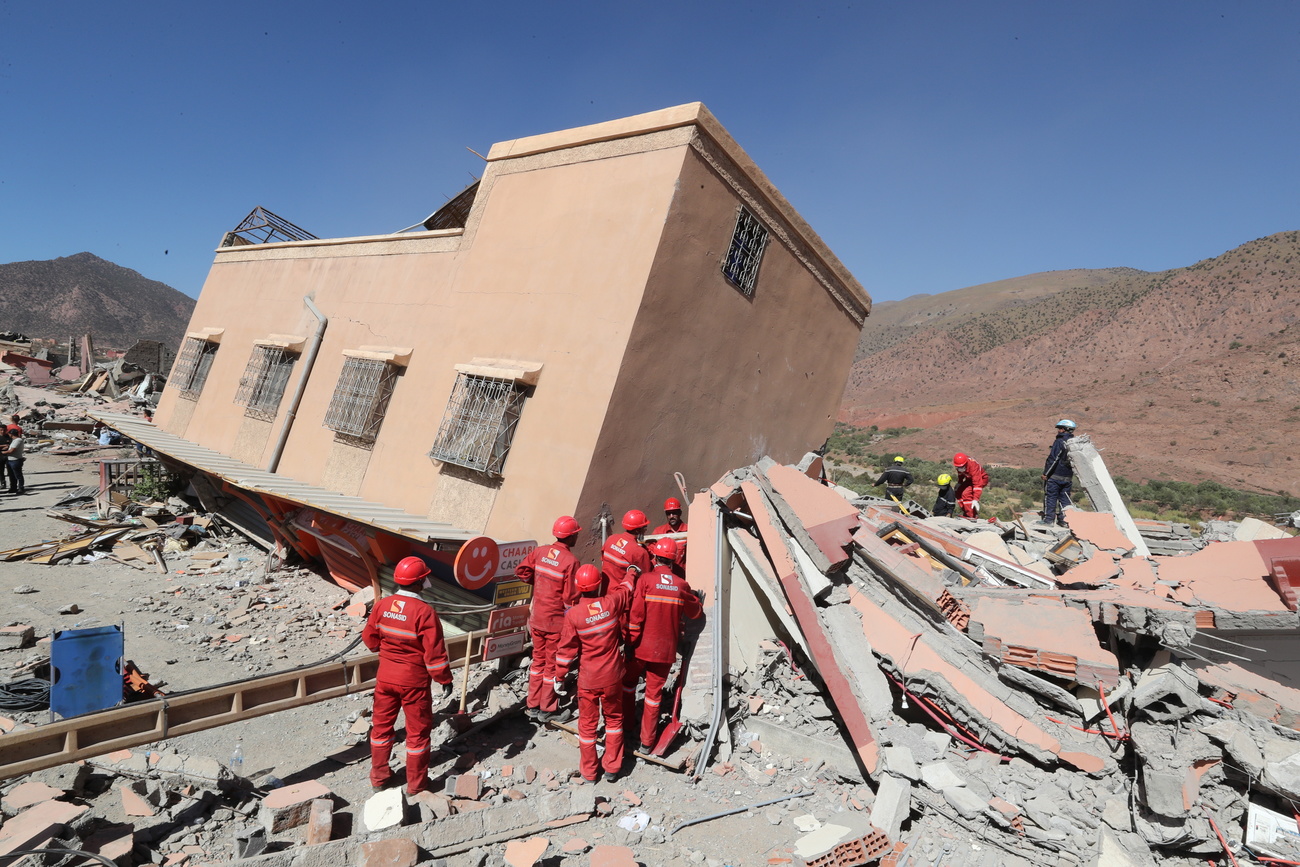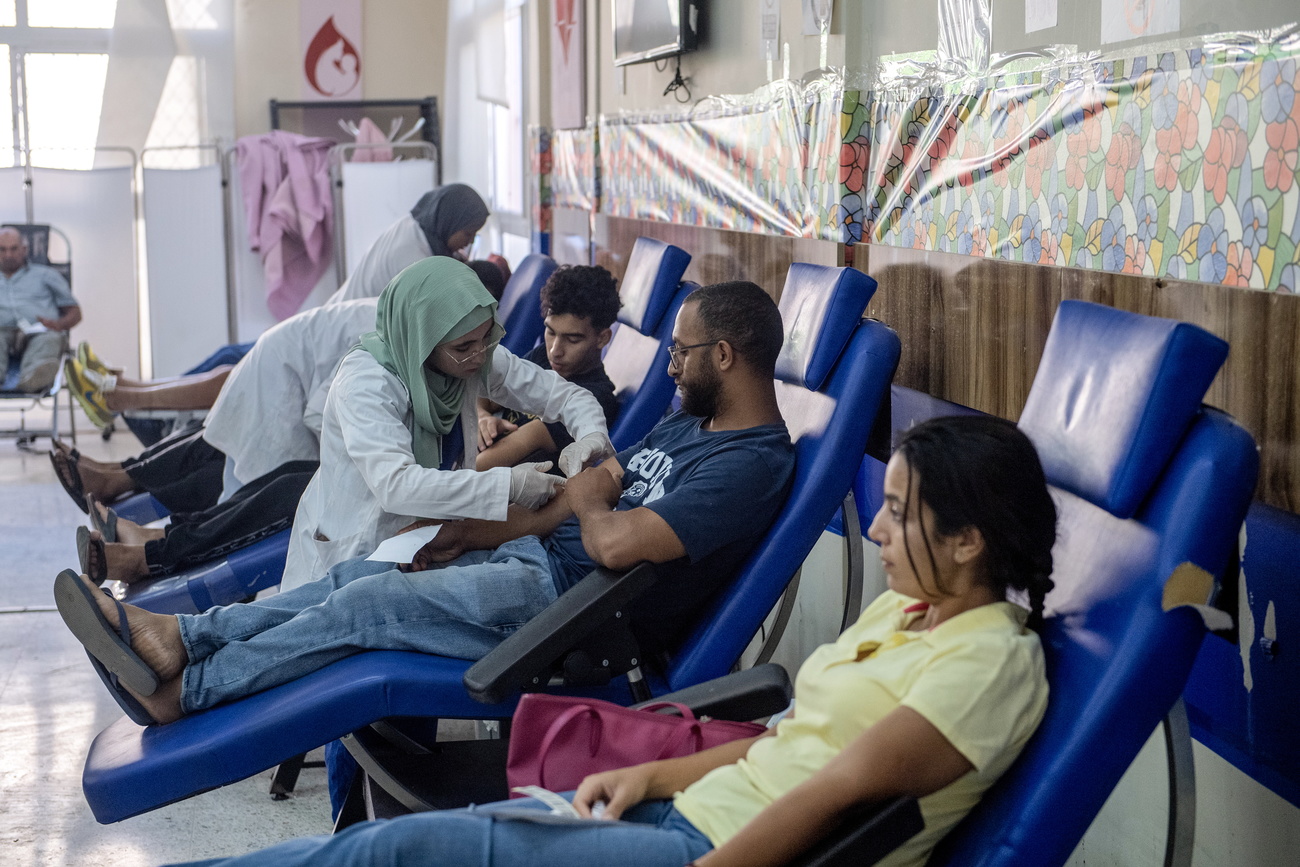
Explainer: the Morocco earthquake and efforts to help

The death toll in the Moroccan earthquake has passed 2,800 people as a number of foreign aid and rescue teams joined an intensifying search for survivors. On Monday, Swiss Solidarity launched an appeal for donations. Switzerland has promised humanitarian support – but is still waiting for the greenlight.
Swiss Solidarity launches Morocco quake appeal
On Monday, Swiss Solidarity, the humanitarian arm of the Swiss Broadcasting Corporation (SBC), SWI swissinfo.ch’s parent company, launched an appealExternal link for donations from the Swiss public for victims of the quake.
Swiss Solidarity has identified two Swiss partner organisations in Morocco – cfd Christlicher FriedensdienstExternal link and Médecins du MondeExternal link – to help provide emergency aid, such as blankets, baby food and other essential items.
“The situation is very difficult on the ground,” Judith Schuler, director of communications and fundraising at Swiss Solidarity, told SWI swissinfo.ch. “Everyone is looking at what they can provide. Everyone wants to do something.”
What emergency assistance has Switzerland offered to Morocco?
On Saturday, the Swiss foreign ministry offeredExternal link support, including emergency shelter, access to clean water and sanitation, as well as medicine and construction technology. The aid would be accompanied by a team of eight specialists from the Swiss Humanitarian Aid Unit (SHA). They are ready to be sent to the country, but the Moroccan authorities have not yet responded formally to the Swiss offer, says the ministry.

Other international offers of support
On Sunday, Moroccan authorities said they had “responded favourably” to offers of help from visiting search and rescue teams from Spain, Qatar, Britain and the United Arab Emirates. But they were yet to accept further offers of aid from France, Germany, Italy, Belgium, Israel, Turkey and the United States.
The state news agency said: “Moroccan authorities have carried out a precise assessment of needs on the ground, given the fact that non-coordination in such situations could be counter-productive.”
Morocco has deployed ambulances, rescue crews and soldiers to the region to help assist with emergency response efforts.
On Tuesday, the Geneva-based International Federation of the Red Cross and Red Crescent Societies (IFRC) launched an emergency appeal to raise CHF100 million ($112.3 million) to support the victims of the earthquake in Morocco with water, sanitation and shelter.

Why is Morocco hesitant to accept the offer of support from Switzerland and other countries?
Silvio Flückiger, deputy head of the SHA crisis unit, told Le Temps newspaper on Monday that the Swiss team of experts was operational and would be ready to board a plane within hours of receiving the green light from the Moroccan authorities.
He believes the Swiss team could get involved later. For the moment, Morocco is in the rescue and first-aid phase, while “Switzerland’s offer is above all aimed at survivors”, he said.
“Each crisis is different, and each country reacts in its own way to the disaster affecting it. It is up to each state to determine what support it needs,” Flückiger added. “According to information provided to us by the Swiss embassy in Rabat, the army and civil protection are well organised and structured to meet needs. But it is true that there are also many access problems in remote areas of the Atlas.”
Observers have other assessments about why Morocco may be hesitating. It could be due to geopolitical reasons, North Africa expert Beat Stauffer told SRF: “Morocco obviously wants to send a signal to France that it is independent, that it no longer needs the old colonial power,” he said. “Morocco does not want to appear as a developing country that cannot cope with such natural disasters itself.”

What’s the humanitarian situation?
The magnitude-6.8 quake struck shortly after 11pm local time on September 8. The epicentre was near the rural town of Ighil, in the Al Haouz province in the High Atlas Mountains, 44 miles (70km) south of Marrakech. Many mountain villages and towns suffered building collapses and devastating damage.
State TV reported late on Monday that the death toll had risen to 2,862, with 2,562 people injured, but those figures looked likely to rise. The World Health Organization said more than 300,000 people had been affected by the disaster.
With much of the quake zone in hard-to-reach areas, authorities have not issued any estimates for the number of people missing and hopes of finding survivors under the rubble are fading with the passage of time.
With the worst-hit area located in rugged, isolated terrain, the picture on Tuesday was patchy, with some organised tent camps being set up and supplies being airlifted in, while in other locations no aid at all had arrived due to roads being blocked by rocks and earth dislodged by the quake.
Since the governments’ rescue work is starting slowly, many individual citizens are helping, according to reportsExternal link. For example, many local people are bringing food, blankets and other relief supplies to a collection point near Marrakesh, which are then distributed to more remote regions, reported Swiss public television SRF.
SRF correspondent Daniel Glaus explained: “The distances are simply very long; you are often stuck for a long time because the roads only have one lane and some of them are still buried.” In addition, there is often a lack of coordination when it comes to help. “Many aid convoys are on the way, but you don’t know who is going where,” he added. “So there is a lot of good will, but far too little coordination.”
How to make a donation via Swiss Solidarity
Donations can be made directly online on the Swiss Solidarity websiteExternal link for victims of the quake in Morocco.


In compliance with the JTI standards
More: SWI swissinfo.ch certified by the Journalism Trust Initiative





























You can find an overview of ongoing debates with our journalists here . Please join us!
If you want to start a conversation about a topic raised in this article or want to report factual errors, email us at english@swissinfo.ch.